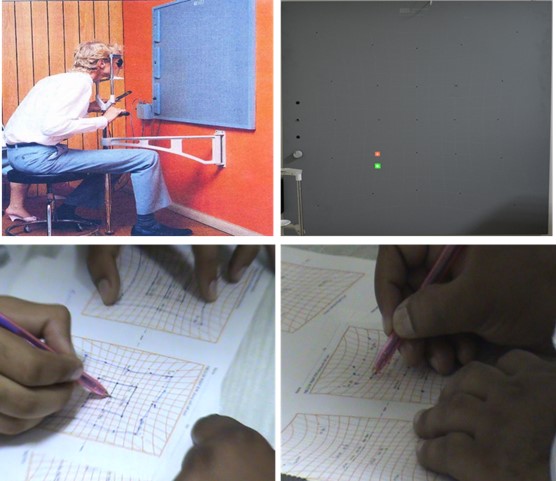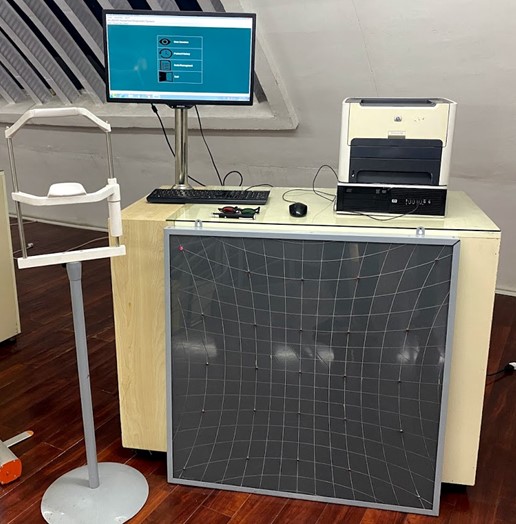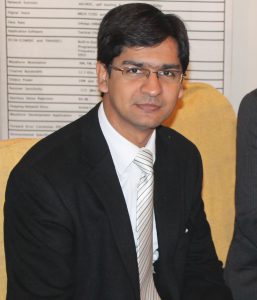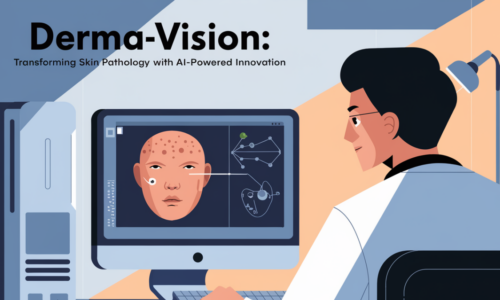Patients who have vision impairment may find it extremely difficult to go about their regular lives. Unfortunately, the number of people in Pakistan affected by vision impairment is staggering; an estimated 21.78 million (Hassan 2019). Such impairments reduce people’s quality of life, which results in a cumulative loss of production and income for the nation.
The squint or strabismus is one of these disabilities. Patients complain of double vision in this condition because their eyes are not correctly aligned. In Pakistan, the overall prevalence of strabismus is 5.4% with most positive cases found in the age group ranging from 6-9 years old (Azam 2019). One child out of every 36 children suffers squint. Medically, Hess screening system is used to test eye squint and strabismus to identify eye muscles, which are responsible for it. The Hess screen and the doctors’ manual marking of points on the Hess graph, which takes 25 to 30 minutes, are traditional screening methods. Figure 1 elaborates the manual process of the Hess screening test.

Considering this as a potential research problem and its socio-economic impact, the researchers at Biomedical Image/Signal Analysis (BIOMISA) research lab, NUST College of EME worked on development of Artificial Intelligence (AI) powered HESS screening system. In close collaboration with Armed Forces Institute of Ophthalmology (AFIO), a specialized hardware with associated software is indigenously developed which has the capability of working in manual and computer-operated modes. In the manual mode, it operates just like traditional systems that the doctors are already familiar with. However, in the new computer operated-mode, the screen is controlled from computer software and operator directly marks points in software. Once he is done marking the points, the Hess graph is created with a single click. The operational time is reduced from 25-30 minutes to only 8-10 minutes.
Video 1: Hess Chart Diagnostic System Demonstration
The developed product includes a Hess screen and the associated Artificial Intelligence software as shown in Figure 2. The main features are:
- It significantly minimizes time and effort while ensuring pinpoint accuracy thanks to its simple editing, auto graphing, and reporting features.
- It digitally stores and retrieves patient test reports without the hassle of tracking them manually.
- It is equipped with report printing and exporting to ready-to-share portable document format where it provides an easy and cost-effective solution without compromising on quality and reliability.
- It also has automated algorithms for analyzing squint and identifying problematic areas

This indigenous Hess screening system serves as breakthrough in reducing the reliance on imported healthcare solutions that are often times too costly for the patients. With the help of NUST IP office, the Intellectual Property Rights are filed in Pakistan IPO and a partnership with RISETech Pvt Ltd is made for commercialization of this product. Such is the utility of this system that it has been successfully adapted by more than 10 hospitals in Lahore, Karachi, and Rawalpindi. This innovation has served more than 6000 patients and have helped them to improve their quality of life. Using healthcare solutions that have been conceived and made in Pakistan is the way forward for the healthcare industry.
Following Intellectual property Rights have been filed against this product:
- Industrial Design: HESS Screening System, 20165-D, Granted 02 June 2022
- Copyright application, Desktop application for HESS screening system, 2020/1709, 20/Jul/2020
Bibliography:
- Azam, P and Nausheen, N and Fahim, MF. “Prevalence of Strabismus and its type in Pediatric age group 6-15 years in a tertiary eye care hospital, Karachi” Biom Biostat Int J 8, no. 1 (2019): 24–8.
- Hassan, Bilal and Ahmed, Ramsha and Li, Bo and Noor, Ayesha and Hassan, Zahid ul. “A comprehensive study capturing vision loss burden in Pakistan (1990-2025): Findings from the Global Burden of Disease (GBD) 2017 study”, Plos One, 2019: e0216492.
The author is a Tenured Professor in the Computer & Software Engineering Department at College of Electrical and Mechanical Engineering (CEME), National University of Sciences and Technology (NUST) and Co-Founder of RISETech Pvt. Ltd. He can be reached at usman.akram@ceme.nust.edu.pk. For more info, please visit www.risetech.pk.
Researcher Profile: https://bit.ly/3Fs24wd






